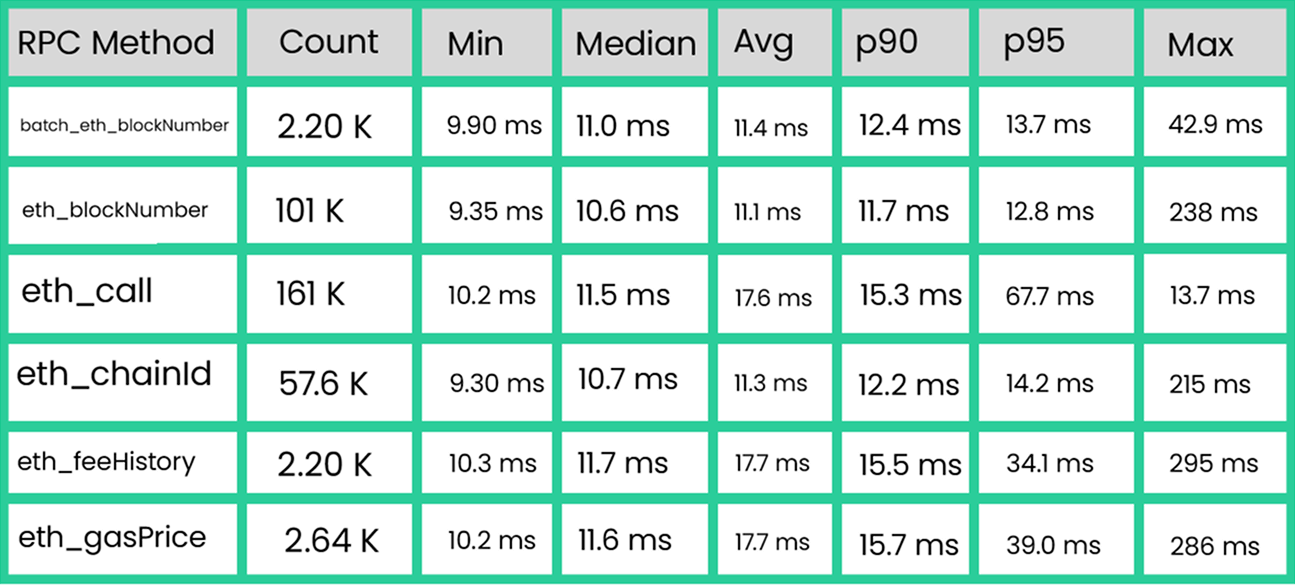Tatum's Ethereum Gateway: 3X Faster Than Self-Hosted Nodes, Stress-Tested to 10,000 RPS



CompareNodes benchmarked Tatum’s Ethereum RPC Gateway against a self-hosted Geth node under heavy load—up to 10,000 requests per second. The results were clear: Tatum delivered up to 3× lower latency, zero errors, and consistent performance at scale. For developers building dApps or infrastructure on Ethereum, this means faster transaction handling, better UX, and less to worry about while building your decentralized app or platform.
[.c-wr-center][.button-black]Get Your API Key[.button-black][.c-wr-center]
Let’s be blunt: in Web3, infrastructure matters. Developers constantly face the trade-off between self-hosted nodes—complex, costly, but fully in your control—and third-party providers that promise reliability but add a layer of dependency. At Tatum, we bridge that gap. Our RPC stack is built for resilience, tuned for throughput, and battle-tested under real-world pressure. We don’t just chase 99.99% uptime—we expect it. No hand-waving, no “just restart the node” excuses. You build, and we handle the backend chaos. Because reliability shouldn’t be aspirational—it should be default.
CompareNodes is an independent agency that conducts unbiased tests of full nodes for companies across the blockchain infrastructure sector. Let’s explore the findings on latency response time and throughput.
We will start with the methodology. The benchmark centered around Ethereum. The scale was set at 1,000 simultaneous requests per second, measuring performance under load. Our Ethereum Tatum Gateway was tested against a control Ethereum self-hosted CompareNode to put the results into a bigger perspective. Nodes were running Go Ethereum (or Geth), which is the most common client for running Ethereum full or archive nodes. They were hosted on Amazon Web Services servers in the Paris region (eu-west-3).
Latency, which is crucial for time-sensitive smart contracts such as decentralized exchanges. 90% of all requests to the control node were faster than 44.0 ms. Tatum Gateway achieved 17.2 ms—three times faster than the self-hosted node.
For the 95th percentile, 95% of all requests to the self-hosted control node were under 58.2 milliseconds, while Tatum Gateway clocked an impressive 41 ms—a difference of 30%.
The average response time for the control node was 17.9 milliseconds, while for Tatum, it was 15.8 ms.
This result especially shows that Tatum has been more reliable, with consistent performance—and faster on top of that.
There were zero errors.
To see how Tatum performs under exceptionally high load, a test with 10,000 requests per second was conducted. Tatum Gateway performed with no slowdowns and zero errors.
The Tatum Enterprise subscription successfully handled up to 4,250 RPCs per second, reaching the current infrastructure setup. Importantly, the system can be easily scaled to support higher traffic with additional nodes. This benchmark proves that Tatum’s infrastructure scales efficiently, with the 4,000 RPS load running flawlessly without any issues.
Self-hosting sounds great—until you hit scaling issues, maintenance hell, or unexplained downtime. Tatum’s Ethereum RPC Gateway skips the drama and delivers exactly what developers need: consistent low-latency performance, no errors under pressure, and zero operational stress. It’s not just a gateway—it’s a serious infrastructure upgrade that lets you build fast, scale confidently, and stop babysitting nodes.
Unlike a self-hosted setup, the Tatum Gateway seamlessly manages both scalability and security, offering a production-ready solution out of the box.
Below you can see a detailed table of the results by specific RPC method at 1,000 RPS.

Build blockchain apps faster with a unified framework for 60+ blockchain protocols.